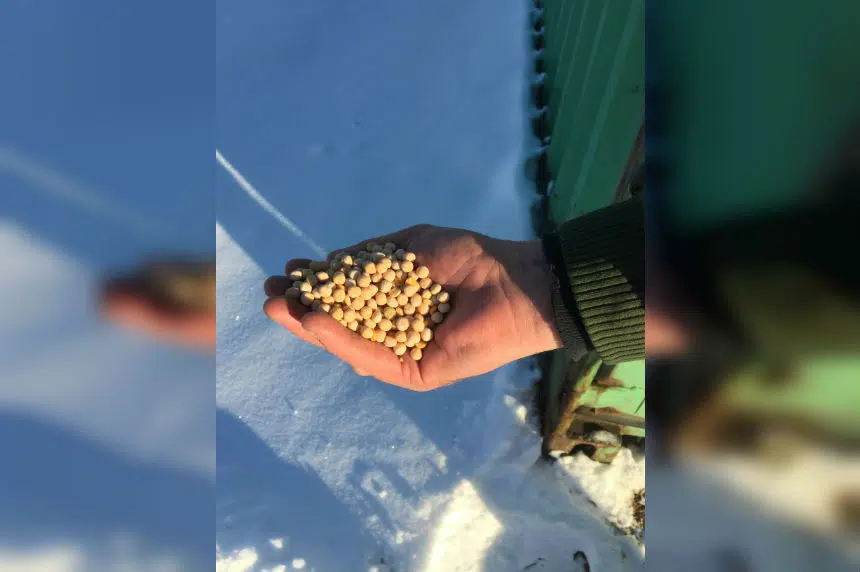A surprise move by a major customer has created concerns for Canadian farmers and industry groups.
India announced Wednesday that it would apply a 50 per cent import tariff on foreign peas.
The country has imported over 1 million tonnes of Canadian peas in each of the last five years, according to Pulse Canada CEO Gordon Bacon.
“This is a game-changer,” he said during an interview Thursday on Gormley.
The Reuters news agency reported Wednesday that the tariff was meant to support India’s own pea growers after prices fell below a support threshold set by the Indian government.
Bacon said the 50 per cent tariff is the highest India was allowed to impose under World Trade Organization rules.
“They went from zero to 50 in one move,” he said.
Bacon said the move might help Indian farmers, who are often among the country’s poorest people, but could also harm others in the country who rely on peas as a staple of their diets.
“India has a dual challenge of trying to provide some levels of price support to Indian farmers and ensure that they have affordable nutrition for over 1 billion people,” he said.
Coincidentally, three Canadian cabinet ministers are due to head to India on a previously planned trade mission starting Nov. 13. Bacon said he and other representatives from Pulse Canada had also made arrangements to visit the country prior to Wednesday’s announcement.
“So it certainly adds some sense of urgency to have this discussion. And that’s really where we’ll look to Ottawa to provide the direction as to how they’re going to react and respond to this change,” he said.
‘These peas will find a home one way or another:’ APAS
President of the Agricultural Producers Association of Saskatchewan, Todd Lewis, said this was quite the shock for producers.
“In the past I think the highest tariff was 10 per cent,” said Lewis. “This is one of the ones that really came out from left field, certainly anything at 50 per cent is going to make it pretty hard to put Canadian peas to that market.”
However, Lewis said India isn’t Canada’s only export market so farmers will be able to export their peas elsewhere.
“(Our) provincial and federal governments, along with grower groups like Pulse Canada and (Pulse) Saskatchewan, have done a great job of market development,” he said.
Lewis said that over the years there’s been more domestic usage with pea factorization plants.
“I think it speaks to the importance of keeping up the pressure on trade and to find as many customers as possible so (we don’t) have all our peas in one basket so to speak,” he said.
He added that if countries like India continue to “play these cards” — referring to raising tariffs, in the trade game — in the long run it’s going to hurt their relationship with other trading countries.
“Growers in Saskatchewan have other options, they don’t necessarily have to plant peas if there’s not going to be a market for them,” Lewis said. “Countries like India need peas at a later date and they might not be available from (Saskatchewan) … It really throws a wrench into the works that’s for sure.”
As for now, Lewis said, “The peas will find a home one way or another” referring to this past summer’s crop that might still be in the bins. Adding that Saskatchewan has what the world wants when it comes to pulses and that producers will find a different market to ship them to if need be.
Sask. Farmer not worried
Ben Wilson has cattle and farms a mixed crop just south of Saskatoon. He said the news from India wasn’t a shock for him.
“I haven’t been farming very long, but I have been doing it long enough to see stuff like this come up before,” Wilson said. “We just had a tariff lifted on Canola basically here a year-and-a-half ago so it’s something I’ve seen come before and I guess you kinda just adjust to it when it happens.”
Wilson said there’s a chance he might be changing up next year’s plant with a few less acres of peas. He added he’s more concerned about what he has stored in the bins right now.
“I talked to my Viterra agent out of Saskatoon today and he was saying they’ve kinda seen this coming for a while and they haven’t even been able to move any peas that they got last fall off the combine yet.”
Wilson added he’s not worried in the long run as there’s pea processing plants in Saskatchewan that are there if a producer needs to move peas bad enough.
For now, Wilson said he’ll keep his peas in the bin.
— With files from 650 CKOM







